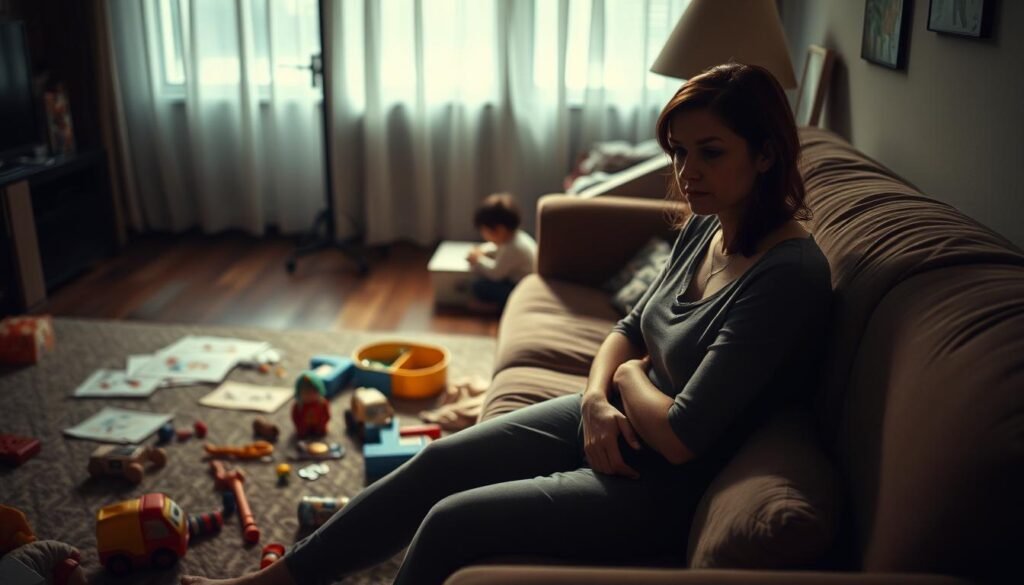Did you know that approximately 1 in 7 new parents will experience postpartum depression? This fact shows it’s more common than many think. Yet, it’s often not discussed enough. After welcoming a new baby, parents might face tough emotional challenges. While 80% of new moms may go through ‘baby blues’ with mood swings and anxiety, it’s vital to spot postpartum depression signs. This condition has more intense symptoms like profound sadness and difficulty caring for the baby, affecting daily life.
Early detection of postpartum depression is key to getting the right help and support. Symptoms can start a few weeks after birth or even during pregnancy. They might last for months if not addressed. Knowing these symptoms is crucial for new parents. It helps everyone create a supportive environment during this difficult period.
Key Takeaways
- Postpartum depression affects approximately 1 in 7 new parents.
- About 70% to 80% of new mothers experience baby blues, which can precede postpartum depression.
- Symptoms of postpartum depression include intense sadness, sleep disturbances, and difficulties in baby care.
- Emotional changes may start within weeks of childbirth, making early identification essential.
- No official test exists, but screenings usually occur around 2-3 weeks post-delivery.
Overview of Postpartum Depression
Postpartum depression (PPD) is a severe emotional condition. It can affect nearly one in eight new mothers within the first year after childbirth. Unlike the baby blues, which are temporary, PPD’s symptoms are more intense and can last longer, often needing professional help.
PPD might show up as deep sadness, guilt, or feelings of not being good enough. It can start one to three weeks after having a baby. Women with a history of depression or who are going through tough times are more likely to get PPD. Changes in hormones after giving birth play a big role in causing these emotional problems.
It’s important to spot Postpartum Depression signs early to get the right support. Health care providers should check all pregnant women and new moms for depression signs. This is vital, regardless of their past health history. If PPD isn’t treated, it can harm both the mom and her baby, leading to issues in bonding and the child’s development.
If you’re feeling down after having a baby, it’s crucial to seek help. There are resources out there. Family and friends should also watch for Postpartum Depression signs in new parents. Kindness and understanding are key to getting better.
For more details on PPD symptoms, click here for additional information.
Understanding Different Types of Postpartum Mood Disorders
New mothers often deal with emotional ups and downs after childbirth. These can lead to various types of postpartum mood disorders. Baby Blues symptoms are common, with mood swings, tearfulness, and irritability. It’s crucial to know about these disorders to spot them early and seek help if needed.
Baby Blues: A Common Experience
Many new moms, up to 85 percent, go through the Baby Blues right after birth. This condition is usually brief, ending within two weeks. Hormonal changes, the stress of being a new mom, and lack of sleep contribute to it.
Though unsettling, Baby Blues often don’t need medical treatment. Support from loved ones can make a big difference, helping moms cope better.
Postpartum Depression vs. Postpartum Psychosis
Postpartum depression is more serious than Baby Blues, affecting about 10 to 15 percent of new mothers. Symptoms include trouble bonding with the baby and feelings of worthlessness. If untreated, some women may struggle for up to three years postpartum.
Postpartum psychosis, on the other hand, is rare but severe. It affects about 0.1 percent of new moms. Symptoms include extreme agitation, delusions, and hallucinations. Immediate medical help is vital. Those with a bipolar disorder history have a 30 percent risk.
With the right treatment, nearly all mothers with severe postpartum psychosis get better. Recognizing differences between these disorders is key. Early detection ensures mothers get the necessary support. For more info, check out this resource.
Symptoms of Postpartum Depression: Recognizing the Signs
Up to 15% of births are impacted by Postpartum Depression (PPD). It shows through various signs. Knowing the Symptoms of Postpartum Depression is key for early help. Early symptoms may look like “baby blues” but are much stronger and last longer. Women might feel extreme sadness, mood swings, and pull away from their babies.
- Persistent sadness
- Severe mood swings
- Loss of appetite
- Overwhelming fatigue
- Suicidal thoughts
If symptoms go on for over two weeks, it’s usually more serious. Getting help from family and friends can reduce PPD’s effects. This support can help mothers form strong bonds with their babies, which is good for the baby’s growth.
For more help, Postpartum Support International has support groups. Knowing the Symptoms of Postpartum Depression is vital. It leads to a better environment for mothers and their kids.
Common Early Symptoms of Postpartum Depression
It’s vital to know the early signs of postpartum depression for quick help and support. These symptoms can show up in one’s emotions and body. They make daily life and family bonds hard. Knowing what symptoms to look for helps people get help or encourage others to do so.
Emotional and Behavioral Indicators
Feeling worthless, anxious, irritable, or guilty can be common. A person might also lose interest in once-loved hobbies or struggle to make choices. They may feel disconnected from their baby or always sad. This can make bonding and handling new tasks tough.
Physical Manifestations
Some may eat or sleep too much or too little, leading to extreme tiredness. Others might have less desire for sex or frequent mood changes. These show how hard postpartum depression can be. About 15% of women feel these symptoms clearly within the first month. Yet, others may notice them slowly over time.
| Symptom Type | Examples of Symptoms |
|---|---|
| Emotional | Worthlessness, anxiety, irritability, guilt |
| Behavioral | Loss of interest in activities, decision-making difficulties |
| Physical | Changes in appetite, sleep issues, fatigue |
| Other | Mood swings, lower libido |
Being aware of postpartum depression signs early on helps in finding treatment faster. It’s important for both moms and partners to know these signs. This way, the whole family gets a better chance at healing emotionally and mentally.
Risk Factors for Postpartum Depression
Many factors can increase the risk of postpartum depression (PPD). It’s vital to know these factors to support those in need better. They include personal history, family background, and life stressors.
Personal and Family History
A history of depression makes postpartum depression more likely. Those who’ve struggled with depression or anxiety might be at higher risk. Also, if mental illness runs in the family, the chances of PPD could go up. These are important signs for doctors to help new parents.
Life Stressors and Support Systems
Life stressors like money worries, relationship problems, or care for a newborn can increase stress after childbirth. Without strong support from family, friends, or doctors, it’s harder to recover. Challenges like caring for a baby with special needs or dealing with a hard birth add to the stress. Handling these issues is crucial for coping well during the postpartum period.
Importance of Early Detection and Treatment
Knowing early signs of postpartum depression is key to helping new parents recover. It’s vital to look for warning signs right after birth. What starts as sadness can get worse, affecting how parents care for their newborn.
Signs to Look Out For
Be on the lookout for signs that might mean postpartum depression. These signs include:
- Prolonged sadness or hopelessness
- Severe anxiety and agitation
- Changes in appetite and sleep patterns
- Loss of interest in activities previously enjoyed
- Difficulty concentrating or making decisions
- Thoughts of self-harm or harming the baby
Seeing these signs early is crucial. Quick action can really help.
When to Consult a Healthcare Provider
Knowing when to get help is crucial. If signs last over two weeks or get worse, see a doctor right away. Quick help is key once symptoms get severe.
Many new moms don’t get asked about their mental health. Doctors need to check for signs early to help moms recover sooner.

| Timing of Symptoms | Duration | Frequency of Monitoring |
|---|---|---|
| Baby Blues | 3-5 days post childbirth, lasting a couple of weeks | Care providers often monitor this during checks |
| Postpartum Depression | Starts weeks to 6 months after childbirth, lasting several months or years if untreated | Regular screenings needed, especially if risk factors are present |
Early action and monitoring can really help. Fast help gives the support needed for recovery.
Postpartum Depression in Partners
Postpartum depression is not just for new moms. About 10% of men struggle with it too in the first year after a baby’s birth. They face sadness, anxiety, and tiredness, just like women do.
Money problems and tough relationships can make it worse. If one partner is depressed after the baby comes, the other might feel the same way. This shows how everyone’s mood in the family matters.
Even though they want to help, some new dads deal with their own mental health issues. This problem can affect the whole family. It’s really important to help dads as much as moms for everyone’s happiness.
- 20% of men may experience significant anxiety levels postpartum.
- 30% of individuals suffering from postpartum depression do not seek help.
- Prolonged symptoms can impact relationships and parent-child interaction.
It’s good for families to talk about postpartum depression in dads. Partners should be supported to get help just like moms. This way, both parents can tackle parenting challenges together.
Impact of Untreated Postpartum Depression
The impact of untreated postpartum depression affects the mother and her loved ones. This includes children and partners. About 5% of women face high levels of depression symptoms for three years after giving birth. Knowing how it hits everyone underlines the need for quick help and care.
Effects on Mothers
Mothers with ongoing symptoms face tough obstacles. Untreated depression may cause long-term mental health issues. It can make mothers less involved in parenting and feel very isolated. Sleep issues, often starting in pregnancy, make things worse.
This lack of sleep raises the risk of thinking about suicide. This shows how crucial real treatment plans are.
Consequences for Children and Partners
The effects on children from maternal depression worry us too. These kids might have behavioral issues and lag in learning. Even the partners feel more stress. This tension can mess up the family’s harmony. Women without support or with past mood disorders are especially vulnerable. This shows how vital regular check-ups and good support circles are.

| Group | Percentage | Symptoms Over Time |
|---|---|---|
| Low Symptoms (remained low) | ~75% | Consistent low levels |
| Worsening Symptoms | 8% | Low at 4 months, increased over time |
| Moderate Symptoms | 13% | Decreased over time |
| Persistently High Symptoms | 5% | High levels for years after birth |
Recognizing Warning Signs of Severe Depression
It’s key to know the warning signs of severe postpartum depression for safety and help. Severe symptoms can be uncontrollable crying or deep sadness. You might even see things that aren’t there. Parents with these heavy feelings after having a baby should get help right away.
About 1-2 out of 1000 births lead to postpartum psychosis. This stat shows how serious it can be. If you’ve been depressed before, you’re more likely to be again. Up to 40% of those with a past episode will experience it again. So, spotting these signs early matters a lot.
Common signs to watch for include:
- Persistent feelings of sadness
- Loss of interest in activities
- Fatigue and exhaustion
- Changes in appetite or weight
- Sleep disturbances
- Difficulty concentrating
- Thoughts of self-harm or harming the baby
If you start feeling any of these, see a doctor or a mental health expert quickly. Doing so helps you get a treatment plan made just for you. This increases your recovery chances. Also, the National Suicide Prevention Lifeline is a great resource for those who need support.
Treatment Options for Postpartum Depression
Treatment for postpartum depression comes in many forms to help new moms recover. It works best when it combines meds, therapy, and support from the community. Most women see a big improvement with a plan that fits their needs.
Therapy and Counseling
Therapy is a key part of getting better. Cognitive-behavioral therapy (CBT) is really helpful. It teaches moms how to handle tough thoughts and feelings. Psychotherapy lets them explore feelings and find ways to cope. This eases the move into motherhood.
Relaxation methods like deep breathing and guided imagery also help a lot. Studies back up their benefits.
Medication and Support Groups
Medicines often go hand in hand with therapy, helping 90% of women. SSRIs like paroxetine and sertraline treat sleep and appetite issues. Support groups are also great. They let moms share and get strength from each other’s stories.
Being around others who get what you’re going through is very helpful. They offer emotional and sometimes practical help too.

Preventive Measures for Postpartum Depression
Preventive steps are key to helping new parents’ mental health. It’s important to talk to healthcare providers about any past mental health problems. This is especially true for those who have had depression before. Getting help before and during pregnancy can reduce the risk of postpartum depression a lot.
Being watched closely and joining support groups or counseling can catch issues early. These steps help new parents feel better emotionally and become stronger. Using services like Postpartum Support International helps in creating a network of support.
Changing how you live can also help avoid challenges after giving birth. Doing things like exercising regularly, eating well, getting enough sleep, and staying away from alcohol can make a big difference in mental health. These changes should go hand in hand with professional care for the best outcome.
| Preventive Strategies | Benefits |
|---|---|
| Open Communication with Healthcare Providers | Identifies risk factors early |
| Engagement in Counseling | Fosters emotional support |
| Participation in Support Groups | Encourages shared experiences |
| Regular Physical Activity | Improves mood and energy levels |
| Healthy Eating | Supports overall well-being |
| Adequate Rest | Enhances emotional recovery |
| Avoiding Alcohol | Reduces mood instability |
Overall, taking early action helps a lot in reducing risk of postpartum depression. These steps not only make mental health better for parents but also create a caring environment for their babies. Finding strength in resources and community support can greatly change the postpartum experience.
Conclusion
It’s key to see the signs of postpartum depression early on. This helps support new parents and their loved ones. About 1 in 7 mothers face this issue. Knowing the signs can help improve mental health and family life.
Spotting it early is very important. It can show up weeks or months after having a baby. This info comes from many studies.
Knowing what increases the risk is crucial. This includes past depression, high stress, and not enough support. With this knowledge, people can take steps to stay mentally healthy. Getting therapy and medication can help manage postpartum depression. This means parents can do well in their new roles. Tools like the Antepartum Questionnaire are also helpful. They show how important it is to get help.
The end message on postpartum depression is about the power of support and talking openly. Getting help, either from professionals or the community, is key. This makes it easier for families during this tough time. It leads to a healthier setting for parents and kids.